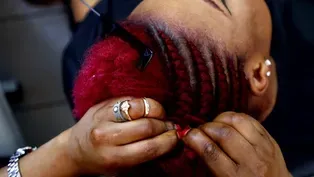
Supreme Court pauses deportations of more Venezuelans
Clip: 4/19/2025 | 6m 2sVideo has Closed Captions
Supreme Court temporarily blocks Trump from deporting more Venezuelan migrants
In an unusual late-night order, the Supreme Court temporarily barred the Trump administration from deporting Venezuelan migrants being held in Texas using an 18th century law called the Alien Enemies Act. The order came in response to an emergency petition filed by the ACLU, with Justices Thomas and Alito dissenting. John Yang speaks with Amy Howe of SCOTUSblog for more.
Problems with Closed Captions? Closed Captioning Feedback
Problems with Closed Captions? Closed Captioning Feedback
Major corporate funding for the PBS News Hour is provided by BDO, BNSF, Consumer Cellular, American Cruise Lines, and Raymond James. Funding for the PBS NewsHour Weekend is provided by...

Supreme Court pauses deportations of more Venezuelans
Clip: 4/19/2025 | 6m 2sVideo has Closed Captions
In an unusual late-night order, the Supreme Court temporarily barred the Trump administration from deporting Venezuelan migrants being held in Texas using an 18th century law called the Alien Enemies Act. The order came in response to an emergency petition filed by the ACLU, with Justices Thomas and Alito dissenting. John Yang speaks with Amy Howe of SCOTUSblog for more.
Problems with Closed Captions? Closed Captioning Feedback
How to Watch PBS News Hour
PBS News Hour is available to stream on pbs.org and the free PBS App, available on iPhone, Apple TV, Android TV, Android smartphones, Amazon Fire TV, Amazon Fire Tablet, Roku, Samsung Smart TV, and Vizio.
Providing Support for PBS.org
Learn Moreabout PBS online sponsorshipJOHN YANG: Good evening.
I'm John Yang.
In an unusual late night order, the Supreme Court temporarily barred the Trump administration from deporting Venezuelan migrants being held in Texas using an 18th century law called the Alien Enemies Act.
The brief unsigned order came in response to an emergency petition filed by the ACLU just hours before Justices Clarence Thomas and Samuel Alito dissented.
It's the latest chapter in the challenges to President Trump's deportation strategy which are being fought out in a number of federal courts.
Amy Howe covers the Supreme Court for her website, amylhow.com and for SCOTUSBlog.
She's also argued cases before the Supreme Court.
Amy what exactly did the court do today?
And maybe just as important, what didn't they do?
AMY HOWE, SCOTUSblog: What the court did was the court barred the federal government, until the Supreme Court says otherwise, from removing Venezuelan migrants who are at a particular detention facility.
Really the case comes out of the Northern District of Texas, where a facility known as the Bluebonnet Detention Facility in Anson, Texas, is located.
And so lawyers from the ACLU had come to the Supreme Court filing an emergency appeal asking the justices to block the removal of Venezuelan migrants from that facility to El Salvador.
And the Supreme Court at 1 a.m. on Saturday morning issued an order that said until further notice from this court, the federal government can't remove anyone from this district.
The Supreme Court hasn't said anything about the substance of the president's order, which he issued back in March, relying on this Alien Enemies Act, this 1798 law that gives the president the power to order the removal of enemy aliens without, you know, to have them be removed relatively quickly.
You know, the order has only been -- the law has only been invoked three times in U.S. history during the War of 1812, during World War I, and during World War II.
And some lawyers and legal scholars say that the president can't rely on this law at all to remove anyone right now.
But the Supreme Court isn't weighing in on that right now, at least.
JOHN YANG: As we said, the court acted, not known for its speed, but had remarkable speed last night.
They did this just hours after the case was filed.
They didn't wait for the appeals court to act.
What does that say to you?
AMY HOWE: It says that they wanted to be -- they wanted to act quickly.
You know, not only did they not wait for the appeals court to act, they didn't wait for the federal government to weigh in.
You know, they directed the federal government to file a response as soon as possible, which is also unusual.
Usually they set a deadline for the federal government, but in this case, they just said as soon as possible after the court of appeals has weighed in.
And I think they wanted to act.
They wanted to make sure that these flights didn't take place.
You know, it's interesting because during a different hearing involving these flights in Washington, D.C. Before Chief Judge James Boasberg on Friday, a government lawyer represented to Judge Boasberg that there weren't going to be any flights on Friday or Saturday.
And yet the Supreme Court still took the really unusual step of issuing this order to make clear that these flights should not take place and that no one should be removed from this part of Texas to El Salvador.
JOHN YANG: Much has been made about the government's reaction, the administration's reaction, in response to the earlier Supreme Court ruling in the Abrego Garcia case.
Do you think that had anything to do with it?
AMY HOWE: I think it probably had a lot to do with it.
The lawyers from the ACLU referenced it obliquely in their briefs.
They said, you know, if you are going to send people over to El Salvador and if a mistake is made, you know, just sort of throw up your hands and say there's nothing we can do, then it is doubly important to make sure that there is due process and that the courts of this country can review these removals before they take place.
And then also, they're very clear in their wording in this order, saying, you know, until further notice from this court, you know, the government should not remove anyone because they've seen some of the sort of word games that have been played right now in the courts sort of about what exactly it means for the federal government to facilitate Abrego Garcia's return from El Salvador.
JOHN YANG: As you said, no court has ruled on the - - whether the administration has the right to use the Alien Enemies Act and the way they're using it.
Is it possible, or do you think it's likely or unlikely that the court could do that now in this case?
AMY HOWE: It's not clear when it's going to do that.
I mean, it seems inevitable that it's going to have to do that.
And as some legal scholars have pointed out, you know, the Supreme Court could save everyone a lot of trouble if it went ahead and ruled on this.
You know, if it were to rule that the Trump administration could rely on the Alien Enemies Act, then we'd still need to have this process before someone could be removed to El Salvador.
But if it were to rule that the Trump administration can't rely on the Alien Enemies Act, then it would certainly obviate the need for all of these proceedings because people couldn't be removed.
JOHN YANG: So what's next?
AMY HOWE: What's next is we now wait for the federal government to file its response to the application for the stay because the Supreme Court temporarily put the proceedings on hold.
But we'll see what the federal government has to say next and what the Supreme Court says after that.
JOHN YANG: We'll be watching.
Amy Howe, thank you very much.
AMY HOWE: Thanks for having me.
How synthetic braids may pose health risks for Black women
Video has Closed Captions
How synthetic braiding hair may be putting Black women’s health in jeopardy (7m 18s)
News Wrap: Russia, Ukraine swap POWs in temporary ceasefire
Video has Closed Captions
News Wrap: Russia and Ukraine swap POWs amid temporary ceasefire (3m 12s)
Retired firefighter looks back at tragedy of OKC bombing
Video has Closed Captions
Retired firefighter looks back at tragedy of Oklahoma City bombing, 30 years later (6m 37s)
Providing Support for PBS.org
Learn Moreabout PBS online sponsorshipSupport for PBS provided by:
Major corporate funding for the PBS News Hour is provided by BDO, BNSF, Consumer Cellular, American Cruise Lines, and Raymond James. Funding for the PBS NewsHour Weekend is provided by...














